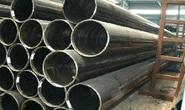Government/Policy

February 12, 2019
Final AD/CVD Decisions on LDW Pipe from China and India
Written by Sandy Williams
A recently published report by the U.S. International Trade Commission concerning the import of large diameter welded pipe from China and India had mixed results regarding injury to domestic producers.
The Commission made a final affirmative determination of injury in the antidumping investigation of LDW line pipe from China, but voted to terminate the accompanying countervailing duty investigation.
LDW line pipe from India received an affirmative determination of injury in both the antidumping and countervailing investigations.
The Commission affirmed the antidumping and countervailing investigations into imports of LDW structural pipe from China, as well as the antidumping investigation of structural pipe from India. The countervailing investigation of India imports of the product was terminated.
AD/CVD investigations into imports of LDW stainless steel pipe from both India and China were terminated.
Antidumping and countervailing duty orders will be issued on the products cited by Commerce.
Publication of the USITC determination was delayed until Feb. 5 due to the partial government shutdown. The American Line Pipe Producers Association were the petitioners in the investigations.,
The report is significant in that it is the first AD/CVD decision made by the ITC since Section 232 tariffs went into effect in March 2018. LDW line and structural pipe were among those steel products hit by quotas and 25 percent tariffs.
“Although duties under Section 232 cover subject imports from all sources, the duties do not appear likely to slow the influx of subject imports,” said the Commission’s report. “Moreover, the Section 232 duties have increased raw material costs for the domestic producers, rendering them more susceptible to further injury from the subject imports.”
The report notes that importers said they were experiencing supply constraints from quotas and were unable to fill orders last year.
“Importers also reported additional arranged subject imports for 2019. These arranged imports alone indicate that increased volumes of subject imports were likely in the second half of 2018 and that the Section 232 measures have not halted the increase in subject imports,” the report adds.
The impermanent nature of the Section 232 measures may impact future AD and CVD investigations, said one trade lawyer in comments to Inside U.S. Trade. “You don’t know how long it’s going to be there – it could end tomorrow.”







